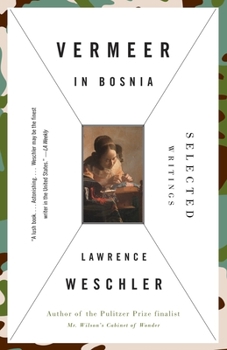Vermeer in Bosnia: Selected Writings
Select Format
Select Condition 
Book Overview
From the master chronicler of the marvelous and the confoundingauthor ofMr. Wilson's Cabinet of Wonderhere is a much-anticipated new collection of more than twenty pieces from the past two decades,... This description may be from another edition of this product.
Format:Paperback
Language:English
ISBN:0679777407
ISBN13:9780679777403
Release Date:July 2005
Publisher:Vintage
Length:432 Pages
Weight:0.90 lbs.
Dimensions:0.9" x 5.3" x 8.1"
Customer Reviews
4 ratings
Gem of a book
Published by Thriftbooks.com User , 16 years ago
One of several books I buy for all my friends, and which they invariably love. It's an excellent collection of Weschler's work.
A Fantastic Collection From One of Our Great Writers
Published by Thriftbooks.com User , 17 years ago
Though ultimately difficult to categorize, the simplest way to describe what Lawrence Weschler does for money would be to say he is an art critic. However readers familiar with Weschler's work will understand why this label seems so insufficient. As a contributer to some of the more important journals of cultural and artistic thought, Weschler not only expounds educatedly on the art and lives of some of the greatest creative minds of history, but he also manages to find ways to uncover the deeper connections that underlie and tie together the experiences and creative output of seemingly disparate times, ideas and cultures. For example, rather than including a separate critical/biographical pieces about such essential talents as Roman Polanski, Jerzy Urban and Art Spieglman, he presents the reader with a triad of Polish surival stories. Moreover, these are not lightweight, breezy reads that can be absorbed in a single trip to the bathroom. Rather, you find deeply insightful, rigorously researched theses exploring how the unique life experiences of his subjects mirror patterns evident in their own respective bodies of work. Ultimately, reading Weschler makes one more attuned to the complex series of interconnections in the world around us--he activates the critical eye in each of us. Readers should also not pass up on the recently collected anthology of his writing on 'convergences', "Everything That Rises".
A Serious Man Who's Good Company
Published by Thriftbooks.com User , 19 years ago
Three of the Wechsler books I own were bought at the beginning of bus trips from South Station, Boston, so to me the New Yorker writer is more of a Hub hero than Johnny Damon or Joe Perry. If you can't make it to Barbara's Books, you won't go wrong online with this, but you might consider one of his slimmer volumes (Mr. Wilson's Cabinet of Wonder for the art, A Miracle A Universe for the justice) as an introduction to this worthy compilation.
Wise, Enthralling, Insightful
Published by Thriftbooks.com User , 19 years ago
In this collection of his essays, written over the past two decades, Lawrence Weschler reports on the summits and troughs of human endeavor. He's often wise, sometimes enthralling, and always insightful. The opening essay, "Vermeer in Bosnia," is worth the price of the book by itself. The setting is The Hague during the Yugoslavian War Crimes tribunal. He contrasts horrifying testimony about war criminals with the career of the famous Dutch artist Jan Vermeer, whose paintings are on display in a nearby museum. Weschler shows us that Vermeer's greatest achievement was to imagine a world of stillness and serenity at a time when all of Europe was being torn apart by national hatreds and religious persecution, and then to will that world into existence through his art. Those magnificent paintings are more than technical triumphs; they are triumphs of the human spirit. The distance between Vermeer and the murderers, rapists and torturers on trial is heartbreaking. Weschler makes us see Vermeer in a new light, and makes us feel in a new way the unique burdens of being human. The second essay in this section uses Shakespeare's Henry V to shed light on the Serbian massacre of thousands of Muslims at Srebrenica. The final essay, "Aristotle in Belgrade" reports on Serbian students using the great philosopher as a propaganda weapon against the state police. Unlike Aristotle, though, these students and the rest of the Serbian citizenry abandoned moral discrimination and particularity in favor of dogma and propaganda. Thinking in slogans led to a collective madness that drove the Serbs to commit unspeakable atrocities and then refuse to take responsibility for their actions. Given the current situation in the Middle East, these essays are timely warnings as well as valuable historical records. Three Polish Survivor Stories, include portraits of film director Roman Polanski, graphic novelist Art Speigelman, and publisher Jerzy Urban. The Polanski essay is fascinating for its psychological portrait of a man who survives by simultaneously mining and jettisoning his past. The most intriguing essay is about Urban, a Jewish boy who survived anti-Semitic persecution to become a young anti-government radical, and, as an older man, a much-reviled government spokesperson for the regime of General Jarulzelski. After that regime collapsed, Urban transformed yet again, this time into a highly successful purveyor of tabloid smut. A cynical, unassimilated survivor through all of it, Urban comes across as both victim and brilliant manipulator of Poland's tortuous postwar politics. The Grandfathers and Daughters section contains six pieces that include Weschler's daughter as well as his grandfather, the composer Ernst Toch. Unlike the big screen portrayals in the rest of the book, the writing here has the narrower appeal of home movies: some heartwarming moments, but more meaningful to the family than the rest of us. The most captivating of the Three





